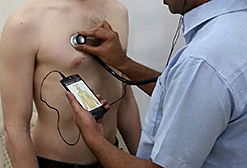My advisor, Dr. Rich Fletcher, and I began our investigation of pulmonary diseases last fall. We learned that these diseases are significant causes of morbidity and mortality and the burden is mostly focused on the developing world. However, the standard techniques for diagnosing these diseases require expensive machines and well-trained technicians, both of which can be lacking in resource-poor settings. As a result, patients are misdiagnosed and do not receive the treatment they need. Rich and I realized that if we combined our skillsets (Dr. Fletcher is an expert in developing low-cost sensors that interface with mobile phones and I am a machine learning researcher interested in developing diagnostic tools), we could develop an inexpensive, portable diagnostic tool kit that could help doctors and health workers provide more accurate diagnoses of pulmonary diseases.
We began data collection last winter, partnering with Dr. Kodgule at the Chest Research Foundation in Pune, India. We initially focused on collecting lung sound data to develop algorithms for the automatic detection of abnormal lung sounds. It soon became apparent that while the identification of these lung sounds would help a physician identify a disease, they were only a small part of the information used to provide a diagnosis. To develop the portable diagnostic kit, more information would need to be captured from an expanded pool of patients.
It was at this point in the project that we learned about Vodafone’s Wireless Innovation Project (WIP). The WIP supports projects that use mobile technologies to improve the lives of people, especially in the developing world. The program was a perfect fit and we learned about it at the same time as realizing that we would need to significantly expand our project.
Dr. Fletcher and I worked together to complete the simple online application and luckily we were selected as semifinalists. Because of our selection, June Sugiyama, the director of the Vodafone America’s Foundation, invited us out to Redwood City, where we presented at the Foundation’s beautiful headquarters. The judges were a phenomenally diverse group of individuals, all of whom provided excellent feedback about ways to improve our project. Dr. Fletcher and I left the session hopeful about winning one of the three prizes, but also impressed with all of the great work done by the other semifinalists.
Just a short time later, we were overjoyed to receive word from June that we had been selected for the third prize; this money would allow us to greatly expand the scope of our research and would help us realize our vision of a portable diagnostic kit. Although our project was at an earlier stage than usual, they believed in the potential of our diagnostic kit and the impact it could make. The prize will be used to fund a piece of the puzzle to create the kit, which is a large-scale data collection effort from patients in hospitals in Pune, India, allowing us to capture many types of information from each patient and explore algorithms to use that information to diagnosis pulmonary disease. As the project has developed, June and her team at the Foundation have continued to provide support and guidance and have worked to connect us with collaborators and partners from around the world. The WIP prize and the Foundation’s support have been instrumental for our ongoing project.
